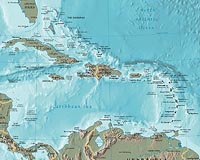| . |  |
. |
Washington (AFP) Jan 17, 2010 Defense Secretary Robert Gates heads to India this week to promote a blossoming "strategic partnership" with a country that has strongly endorsed the US-led mission in Afghanistan. Defense officials said Gates' two-day visit is part of an effort to cultivate a broad relationship with India, a country Washington recognizes as an increasingly powerful player on the international stage. "We obviously view India as a regional power and emerging global power," a senior defense official, who spoke on condition of anonymity, told reporters. "The key objectives for the trip are to emphasize the importance of this bilateral relationship, and the role defense relations play in advancing the strategic partnership," he said ahead of Gates' scheduled arrival on Tuesday. The Pentagon chief had planned initially to head to Australia over the weekend before flying to India but he cancelled that leg of his trip because of the humanitarian crisis in quake-hit Haiti. The US military has launched a major operation involving thousands of troops to boost relief efforts in Haiti after Tuesday's massive earthquake. In his visit to India, Gates was due to meet Prime Minister Manmohan Singh, Foreign Minister S.M. Krishna and Defense Minister AK Antony, press secretary Geoff Morrell said. Washington has been grateful for India's humanitarian aid and steadfast backing for the war against Taliban insurgents in Afghanistan. In November, President Barack Obama rolled out the red carpet for the Indian prime minister in the first full-fledged official visit of his presidency, toasting India as an "indispensable" partner. After decades of mutual unease during the Cold War, ties with the United States have steadily improved and defense ties have expanded since the attacks of September 11, 2001, including annual joint military exercises. A top donor for Afghanistan, India has committed 1.2 billion dollars since 2001 and is building a new parliament, roads and wells for the country. India, which endorsed Obama's decision last month to send 30,000 reinforcements, wants to see the NATO-led war effort in Afghanistan succeed as many of the Islamic militants who found haven in Afghanistan also virulently oppose the secular but Hindu-majority regional power. In his visit to Washington in November, Singh signed a joint statement promising to "enhance" cooperation to counter extremists in Afghanistan. India has not committed troops to Afghanistan, however, as Pakistan has reportedly urged the United States to limit its arch-foe's presence there. Pakistani army chief Ashfaq Kayani in November called India's role in Afghanistan "counterproductive in the war on terror." Gates also will be discussing defense-related trade in his visit, after a deal in July between the two countries opened the way for the sale of sophisticated US weaponry to India. Morrell said Gates was not a "travelling salesman" and his trip was not about trying to sell US defense hardware. But he said "clearly trade will be high" on the agenda. US aerospace giants Lockheed Martin and Boeing have their eyes fixed on a lucrative fighter-jet contract with India. India's private sector defense firms are now allowed to have up to 26 percent in foreign investment, Singh said during his US visit last year.
Share This Article With Planet Earth
Related Links Learn about the Superpowers of the 21st Century at SpaceWar.com Learn about nuclear weapons doctrine and defense at SpaceWar.com
 France retains Caribbean security in vote
France retains Caribbean security in voteFort-De-France, Martinique (UPI) Jan 13, 2009 France has retained control of its strategic security interests in the Caribbean after a tumultuous year that plunged parts of its overseas territories into a rebellion against central rule from Paris and threatened to spark a movement for secession. A referendum in Martinique and French Guiana secured for Paris a "no" vote against greater autonomy that could have opened the way to dema ... read more |
|
| The content herein, unless otherwise known to be public domain, are Copyright 1995-2009 - SpaceDaily. AFP and UPI Wire Stories are copyright Agence France-Presse and United Press International. ESA Portal Reports are copyright European Space Agency. All NASA sourced material is public domain. Additional copyrights may apply in whole or part to other bona fide parties. Advertising does not imply endorsement,agreement or approval of any opinions, statements or information provided by SpaceDaily on any Web page published or hosted by SpaceDaily. Privacy Statement |